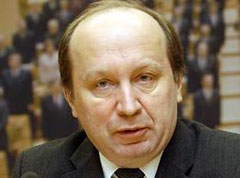Energy, EU – Baltic States, Lithuania
International Internet Magazine. Baltic States news & analytics
Friday, 19.04.2024, 19:34
Kubilius: both Lithuania and EU are to implement commitments on IAE
 Print version
Print version |
|---|
| Andrius Kubilius. |
Kubilius was interviewed by the news agency ELTA before the start of the European Union (EU) summit in Brussels. He stated that the so-called "slow IAE decommissioning" option was considered as a "technical possibility, but he highlighted believing that the European Council would give a green light to the proposed financial assistance for the electricity grid interconnection in the Baltic states.
ELTA"s special correspondent Vaidotas Beniusis reports from Brussels:
- You have accused former Prime Minister Gediminas Kirkilas of not telling the truth to Lithuanians about the impossibility to extend the IAE operation. Can you say the truth?
- I have always said that commitments are to be implemented and these commitments are clear. However, the same protocol includes the EU commitment to prevent Lithuania from facing big problems. These problems might be of various kinds.
Lithuania might be left without electricity; there might be other problems as well. We search for solutions to these problems together with the European Commission. Our further actions also depend on the decisions of the European Council; I mean both the quotas for emissions and 5 billion euros in the Economic Recovery Plan, intended for energy links and the internet. Let us hope that a great part of money from this plan will be allocated to the Baltic Interconnection Plan. We are dealing with these issues quite well. I thanked and expressed my respect to President of the European Commission Jose Manuel Barroso for provided solutions. These solutions allow us to see medium-term problems after the decommissioning of Ignalina plant more optimist
ically. There might be some short-term problems as well and we will have to continue searching for ways to solve them.
- Is the position that the most realistic way-out for the nearest future would be the "slow IAE decommissioning" still maintained?
- We have not discussed such technical details yet. I hope that our decision to establish a special Energy Ministry would help to search for the solutions more efficiency. On the other hand, the conversation with Barroso gave me confidence to view the future positively and to expect that these solutions will be sought.
- What measures do you see applicable in the short period of time from the shutting down of IAE till the erection of electricity links?
- We have discussed that with Barroso and we will continue talking about that. At the moment, I have no reasons to doubt that the European Commission would let us and other countries in the region to live without electricity in January 2010 at the temperature of minus 20 centigrade. I do not think that the European Commission would offer us to buy some candles, wood and live like that. We might discuss various possible solutions: subsidized imports, other kind of assistance, for example, supply of Ukrainian electricity.
- Do you consider a possibility of IAE operating in 2010 as well?
- I think that we all are clever people. When you ask whether such scenarios are possible, I might say that anything can happen, a meteor might fall on Lithuania. I really do not see a scenario depicting Lithuania without electricity and its residents to be forced to buy candles or do similar things. If the decisions of the European Council are such as expected, and I see it in a rather optimistic way, then we will be able to implement our commitments more safely and avoid big problems in 2010 thanks to the energy solidarity of the European Union.








 «The Baltic Course» Is Sold and Stays in Business!
«The Baltic Course» Is Sold and Stays in Business!

